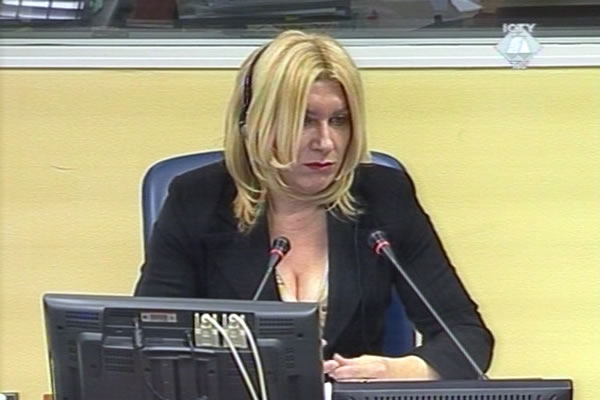Home
WHO SCARED THE SERBS WITH PROPAGANDA?
In response to the prosecution questions, former Serbian intelligence officer Slobodan Lazarevic has said there were some statements on the Croatian side ‘that caused Serbs to feel ill at ease’, but those were just ‘isolated moments’, not obvious propaganda. The Krajina authorities then used those isolated incidents in its campaign to intimidate
 Vesna Škare Ožbolt, svjedok odbrane Ante Gotovine
Vesna Škare Ožbolt, svjedok odbrane Ante Gotovine The cross-examination of former military intelligence officer in the JNA and the SVK Slobodan Lazarevic was completed earlier than expected. The prosecution mostly focused on Lazarevic’s claim that the fear among Krajina Serbs was caused predominantly by the propaganda disseminated by the Krajina authorities. In his examination-in chief, Ante Gotovina’s first defense witness thus confirmed the argument that in August 1995, after Operation Storm, Serbs fled Krajina in fear of retaliation even before the Croatian Army arrived.
The prosecution commented on the witness’s evidence yesterday about the activities of Croatian side that could be easily manipulated by the Krajina authorities. In addition to attacks on the Serbian villages in the Medak pocket in 1993, Lazarevic said today that crimes perpetrated in Operation Maslenica were repeatedly rehashed in the Krajina media side by side with the events from the Ustasha regime in Croatia, from 1941 to 1945. Also Lazarevic said that moves some Croatian politicians made in public were used in the Krajina media for propaganda purposes. He quoted examples of a politician using the Ustasha salute in the Croatian parliament or President Tudjman’s ‘well-known’ statement about ‘Krajina without Serbs’. ‘When you hear something like that, if you are a Serb, you will surely be ill at ease’, Lazarevic concluded.
When the presiding judge insisted that Lazarevic explain if this meant that the fear of Croats among Serbs was created by propaganda disseminated by both sides, the witness said that to his mind, those were just ‘isolated moments’ in the Croatian media, not obvious propaganda; the Krajina authorities then used it in its campaign to intimidate its own population.
As today’s hearing continued, Gotovina’s defense called its next witness, Vesna Skare Ozbolt. At the time of Operation Storm, Skare Ozbolt was Croatian president’s deputy chief of staff. In the statement she gave to the defense in June 2008, tendered into evidence today, Skare Ozbolt states that the Croatian government planned for a peaceful reintegration of Krajina into Croatia. The idea was, Skare Ozbolt said, to demilitarize Krajina and to ‘reintegrate both the territory and the Serb population’ into the constitutional framework of the Republic of Croatia; the return of Croatian refugees to the territory was also envisaged. Something similar occurred later in Eastern Slavonia, Skare Ozbolt explained.
The witness believes that Operation Storm ‘most likely would not have been launched’ if the Krajina delegation had accepted the Z4 plan in Geneva in early August 1995. Skare Ozbolt admitted that the document was ‘unacceptable’ to the Croatian side too, but President Tudjman allowed this plan to be a starting point for the negotiations with rebel Serbs. However, since they turned down the plan, Croatia had to resort to a military solution.
General Gotovina is on trial together with Ivan Cermak and Mladen Markac for crimes during and after Operation Storm. As alleged in the indictment, Gotovina, Cermak and Markac took part in a joint criminal enterprise headed by President Tudjman and aimed at the permanent elimination of Serbs from Krajina. The prosecution called evidence to prove that the plans for the military operation were made before the failure of the Geneva negotiations.
Linked Reports
- Case : Gotovina et al. - "Operation Storm"
- 2009-06-02 SERBIAN INTELLIGENCE OFFICER CALLED AS FIRST WITNESS OF GOTOVINA'S DEFENSE
- 2009-05-29 MARKAC'S DEFENSE: KRAJINA EXODUS FOLLOWED BELGRADE PATTERN
- 2009-05-28 DEFENSE: CERMAK WAS ’CIVILIAN IN MILITARY UNIFORM’
- 2009-06-04 WITNESS: LOOTING AND ARSON IN KRAJINA ANGERED TUDJMAN
- 2009-06-05 TUDJMAN: ‘THERE MUST BE NO MORE THAN 10 PERCENT SERBS LEFT IN KRAJINA’
- 2009-06-08 LINGUISTICS AT THE BRIJUNI MEETING
